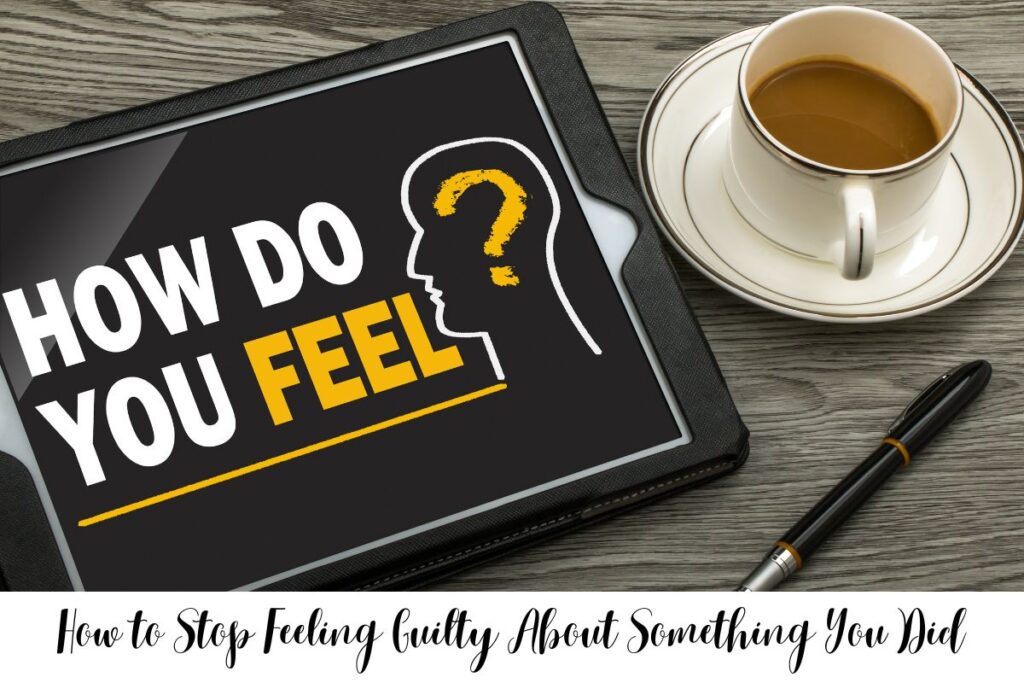Guilt can show up for different reasons, and not all of them mean the same thing.
Sometimes it follows a clear action, you hurt someone, crossed a line, or handled a situation poorly. Other times, the feeling lingers even when nothing objectively wrong happened. The mind keeps replaying events, questioning intent, and assigning blame long after the moment has passed.
Most advice treats guilt as something to get rid of quickly. That approach often fails because it ignores an important distinction: some guilt points to responsibility, while other guilt comes from rumination, fear of judgment, or unrealistic self-expectations.
If you’re stuck in guilt, the problem is rarely the emotion itself. It’s not knowing why it’s there or what it’s asking for.
This page breaks down how guilt works, why it can stay active long after a situation is over, and what actually helps when the feeling doesn’t resolve on its own.
Why Guilt Stays Active After a Mistake
Common Reasons for Guilt

- Hurting Someone Else One of the main reasons we feel guilty is when our actions hurt someone else. This might happen through a hurtful comment, a betrayal, or a choice that negatively affects them. We feel guilty because we care about that person and don’t want to cause them pain.
- Not Living Up to Our Standards Sometimes, we feel guilty because we don’t live up to our standards. It could be not keeping a promise, not giving our best effort, or failing to stick to our values. This kind of guilt often comes from the pressure we put on ourselves and a bit of self-criticism.
- Breaking the Rules Feeling guilty can also come from breaking rules or going against societal or personal ethics. When we do something that clashes with our moral values or violates an agreement with others, we often feel guilty because we recognize it’s wrong.
- Neglecting Responsibilities Guilt can come up when we realize we’ve neglected our responsibilities—whether it’s at work, in our relationships, or even taking care of ourselves. If we don’t fulfil our duties or let others down, it can leave us feeling guilty for not doing what we were supposed to.
- Regret Over a Missed Opportunity Sometimes, we feel guilty for missing out on an opportunity that might have led to something better. We get stuck in “what if” thoughts, like what if I’d said yes, acted sooner, or tried harder?
- Doing Something Out of Character Guilt can arise when we behave in ways that are out of character. If we snap at someone when we’re usually kind or act selfishly instead of being generous, we might feel guilty because it seems like we’re not being true to ourselves.
What Actually Helps Guilt Ease Over Time
Now that we understand some common reasons for guilt, it’s time to explore how to stop feeling bad about something you did.
Here are several ways to work through how to stop feeling guilty about something you did and begin to feel better:
1. Acknowledge and Accept Your Feelings

The first step to overcoming guilt is acknowledging feelings of guilt. It is natural for a person to feel guilty and wrong when mistakes are made. Acceptance is the first step in healing. Don’t ignore your feelings. Recognize that you are human, and it’s okay to have feelings of guilt for something that happened.
2. Understand the Root Cause of Your Guilt

Once you’ve acknowledged your feelings, take some time to reflect on why you’re feeling guilty. Ask yourself:
- What exactly did I do that caused me to feel guilty?
- Was I acting out of anger, fear, or stress?
- How did my actions affect others, and how can I address that?
Identifying the root cause helps you understand whether your guilt is valid and where it’s coming from so you can make a plan for moving forward.
3. Make Amends or Apologize

If what you did hurt someone, one of the best ways to ease that guilt is to try and make it right. Saying sorry or working to fix the situation shows that you care about the other person and recognize the pain you caused. An apology doesn’t undo the mistake, but it can help both of you heal and start moving forward.
4. Learn from Your Mistakes

Guilt is a sign that we may have made a poor choice. Instead of letting the guilt continue, turn it into a lesson. Ask yourself what you can learn from the experience and how you can prevent it from happening again. Understanding the lesson in your mistake helps you feel less bad about it and empowers you to make better choices next time.
5. Shift Your Focus to the Present and Future

Guilt tends to keep us stuck in the past, replaying our mistakes over and over. But the past cannot be changed. Focus on what you can do now to make up for the situation and how you can act differently moving forward. Take small steps to improve your actions today, and look for ways to prevent similar mistakes in the future.
6. Be Kind to Yourself

Self-compassion is crucial in overcoming guilt. We tend to be our harshest critics, but being kind to yourself is essential. Remember that you are not your mistakes, and everyone messes up sometimes. Speak to yourself as you would to a friend in a similar situation—with kindness and understanding.
7. Talk It Out with Someone You Trust

Sometimes, sharing your feelings with a trusted friend or therapist can help you gain perspective. They may help you see that the guilt you’re feeling might not be as intense or lasting as it seems. Talking it out can also help you release the emotional burden and feel less alone in the process.
8. Forgive Yourself

Finally, forgive yourself. Holding onto guilt for too long only harms you. Understand that you are human and imperfect. Once you’ve taken steps to make things right and learned from your experience, give yourself permission to let go of the guilt and move on.
9. Practice Mindfulness

Practicing mindfulness is all about being in the moment and not judging yourself. It’s super helpful when you’re dealing with guilt. By just focusing on your breathing or what’s going on around you, mindfulness can help you stop obsessing over the past and ease some of that emotional stress. It lets you recognize your guilt without letting it take over your life.
10. Reframe Your Thoughts

When you feel guilty, it’s easy to fall into a negative thought pattern, like thinking, “I’m a bad person” or “I’ll never make up for this.” Instead of letting these thoughts take over, try to reframe them. Remind yourself that one mistake doesn’t define you. Focus on what you can do now to improve and how you’ve grown from the experience.
11. Engage in Self-Care

Taking care of yourself physically and emotionally can help you manage guilt. Engage in activities that make you feel good—whether that’s exercising, reading, spending time with loved ones, or enjoying a hobby. By caring for yourself, you create space to heal and ease the emotional weight of guilt.
12. Look at the Bigger Picture

Sometimes we feel guilty because we focus too narrowly on a single mistake or negative event. Think about all the positive things you’ve done and how they balance out your mistake. Recognize that everyone makes mistakes, and a single incident doesn’t erase all the good you’ve done in your life.
13. Talk to a Professional

If your guilt is particularly intense or persistent, talking to a therapist or counselor might be helpful. Professionals can provide tools to help you manage guilt and understand its roots. Therapy can also offer strategies to reframe your thinking and work through difficult emotions in a healthy way.
14. Set New Goals

One of the best ways to move past guilt is to redirect your energy toward something positive. Set new personal goals or focus on personal growth. Whether it’s making amends with others, working on a new project, or improving an aspect of your life, shifting your focus to something productive can help you feel better and reduce guilt.
15. Embrace the Growth That Comes From Mistakes

Rather than feeling bad for making a mistake, embrace the idea that growth comes from challenges and setbacks. Each mistake is an opportunity to become a better version of yourself. By reframing mistakes as opportunities for growth, you allow yourself to move forward with less guilt and more understanding.
When Guilt Doesn’t Resolve on Its Own
Feeling guilty about something you did is completely normal, but it doesn’t have to take over your life. By understanding why you feel that way, reflecting on the situation, and taking steps to make things better, you can begin to heal. Remember, everyone makes mistakes; what really matters is how you learn and move on from them. Be kind to yourself, acknowledge your actions when necessary, and give yourself the room to let go.





